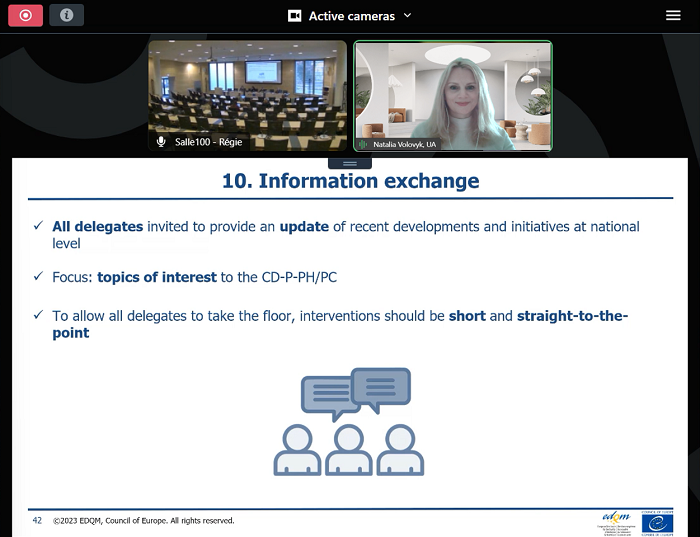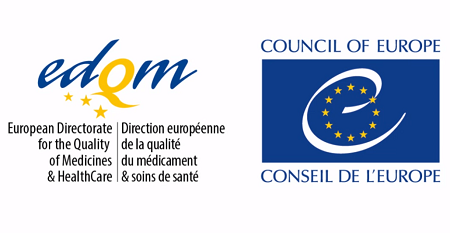On December 6-7, 2023, the 92nd meeting of the Committee of Experts on Quality and Safety Standards in Pharmaceutical Practices and Pharmaceutical Care (CD-P-PH/PC) of the European Directorate for the Quality of Medicines & HealthCare (EDQM) was held in Strasbourg, the French Republic. Natalia VOLOVYK, Deputy Director for Quality of the Ukrainian Scientific Pharmacopoeial Center for Quality of Medicines, participated in the meeting via video conference.
The 92nd meeting of the Committee of Experts CD-P-PH/PC was dedicated to a range of issues regarding the safe and effective use of pharmaceutical preparations.
EDQM Initiative on Drug Shortages
CD-P-PH and the European Pharmacopoeia Commission have decided to contribute to reducing the negative impact of drug shortages by implementing two related but separate projects that aim to support the preparation and quality control of standardized unlicensed pharmaceutical preparations to be used as temporary substitutes for unavailable drugs.
Implementation of Automated Dose Dispensing Guidelines
The pilot project aims to test the implementation of Automated Dose Dispensing Guidelines (ADD), developed by CD-P-PH/PC, at the national level.
Oncology Medicines
The results of the survey showed that in hospital pharmacies patients are prescribed reconstituted medicines with a longer shelf life, which may pose a health risk. There is a need to develop guidelines to confirm the appropriate use of reconstituted medicinal products, indicating the sources to be relied upon when deciding to extend the shelf life of reconstituted medicinal products.
Safe Use of Herbal Products Project
Projects have been prepared for Guidance for Healthcare Professionals and leaflets for patients/consumers.
Traceability of Medicines in Hospital Settings Project
The draft Guidelines on traceability of medicines in hospital settings was discussed. Delegates emphasized the need to harmonize practices to prevent the creation of different barcoding systems in pharmaceutical companies and hospitals.
In order to ensure the recognition of standards by different IT systems and to avoid duplication of work, the use of universal standards (for example, GS1 or ISO standards) is proposed.
Attention should also be paid to the traceability of medicinal products that are taken out of the primary packaging for inclusion in ADD containers/packages.
New projects
A project proposal for the creation of a guidance document for healthcare professionals on providing appropriate advice to patients undergoing cytotoxic treatment was considered. The Secretariat presented the aforementioned proposal and highlighted the project's background, objectives, added value, working methods, expected outcomes, and potential stakeholders who may be involved in the project. Delegates preliminarily approved the project proposal.
Information Exchange
Delegates provided an overview of recent developments at the national level in the areas covered by CD-P-PH/PC. Delegates from the following countries spoke and exchanged information: Armenia, Austria, Bulgaria, Cyprus, Czech Republic, Estonia, Iceland, Italy, Latvia, Luxembourg, Netherlands, North Macedonia, Norway, Portugal, Slovenia, Turkey and Ukraine.
Natalia VOLOVYK informed the Committee about the adoption of a new law regulating the mechanisms for creating an effective public healthcare system in Ukraine; the implementation of an electronic system for prescription medicines (except for extemporaneous pharmacy preparations and medicines dispensed under specific conditions); harmonization of the cancer register, which now fully meets international standards and covers all regions of Ukraine; a new bill prohibiting physicians from receiving gifts for prescribing certain medicines and obliging pharmacists to inform patients about possible alternative medicines; the nomination of an expert from Ukraine appointed to participate in the EDQM initiative on drug shortages; issues associated with the misuse/off-label use of Ozempic; the next stage of healthcare system reform, which is set to begin in 2024 with a view to aligning the national healthcare system with European standards, including improvement of the healthcare information system, tackling antimicrobial resistance, creation of a single state control body in the pharmaceutical sector tasked with the implementation of state policies related to marketing authorization, quality control as well as safety and efficacy of medicines.





